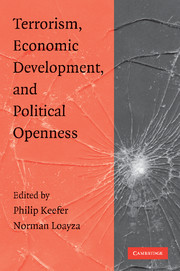Book contents
- Frontmatter
- Contents
- List of Tables
- List of Figures
- Contributors
- Overview: Terrorism, Economic Development, and Political Openness
- PART ONE THE COSTS OF TERRORISM
- PART TWO DEVELOPMENT, DEMOCRACY, AND THE ORIGINS OF TERRORISM
- 3 From (No) Butter to Guns? Understanding the Economic Role in Transnational Terrorism
- 4 The Lexus and the Olive Branch: Globalization, Democratization, and Terrorism
- 5 Kto Kogo?: A Cross-Country Study of the Origins and Targets of Terrorism
- 6 Terrorism and Civil War
- PART THREE THE ORIGINS OF TERRORISTS
- Appendix
- Index
- References
4 - The Lexus and the Olive Branch: Globalization, Democratization, and Terrorism
Published online by Cambridge University Press: 06 July 2010
- Frontmatter
- Contents
- List of Tables
- List of Figures
- Contributors
- Overview: Terrorism, Economic Development, and Political Openness
- PART ONE THE COSTS OF TERRORISM
- PART TWO DEVELOPMENT, DEMOCRACY, AND THE ORIGINS OF TERRORISM
- 3 From (No) Butter to Guns? Understanding the Economic Role in Transnational Terrorism
- 4 The Lexus and the Olive Branch: Globalization, Democratization, and Terrorism
- 5 Kto Kogo?: A Cross-Country Study of the Origins and Targets of Terrorism
- 6 Terrorism and Civil War
- PART THREE THE ORIGINS OF TERRORISTS
- Appendix
- Index
- References
Summary
This chapter provides an original study into how democratization and globalization influence terrorism, examining the motives of terrorists and how democratic institutions and international integration influence nonstate economic actors. We employ a gravity model to investigate the relative importance of globalization and democratization on transnational terrorism. We construct an original database of more than 200,000 observations from 1968 to 2003 for 179 countries to examine the extent to which economic, political, and historical factors influence the likelihood of citizens from one country to engage in terrorist activities against another. We find that the advent of democratic institutions, high income, and more openness in a source country significantly reduce terrorism. However, the advent of these same positive developments in targeted countries actually increases terrorism. Ceteris paribus, the effect of being a democracy or participating in the WTO for a source country decreases the number of transnational terrorist strikes by about two to three per year, which is more than two standard deviations greater than the average number of strikes between any two countries in a given year.
Introduction
World foreign direct investment flows (FDI), which amounted to less than $13 billion in 1970, quadrupled every ten years, reaching $54 billion in 1980 and $209 billion in 1990. During the last half of the 1990s, however, FDI practically exploded, reaching a peak of $1.4 trillion in 2000. Worldwide trade also increased dramatically over the same time period.
- Type
- Chapter
- Information
- Terrorism, Economic Development, and Political Openness , pp. 116 - 147Publisher: Cambridge University PressPrint publication year: 2008
References
- 48
- Cited by



